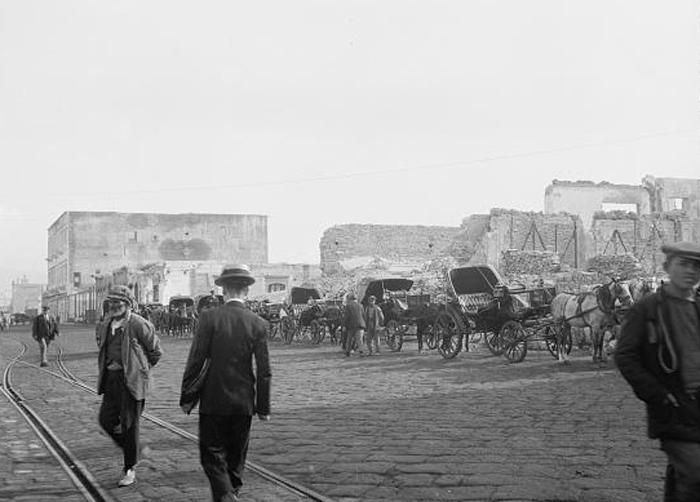Turks recapture Smyrna from Greece as peace conference is proposed to end dispute
Smyrna, 25 September 1922 – Turkish forces have recaptured – and destroyed – the strategically significant city of Smyrna which is situated on the Aegean coast.
The Turks and Greeks have been engaged in conflict since May 1919, when Greek forces occupied the port city with the backing of Great Britain, France and the United States. This followed the defeat and break-up of the Ottoman Empire at the end of the Great War.
Since 1919, Smyrna has been used as a base for the launch of a series of Greek offensives in the region which have been met by fierce Turkish resistance.
In the recapture of Smyrna, it was understood that much of the city was destroyed by fire. The Press Association is reporting eyewitness accounts from US sailors on patrol in the region, who claim to have seen Turkish soldiers setting fire to homes and to heaps of rubbish in the street.
The fires were started, it is believed, in the Armenian quarter but spread to other parts of the city when the winds changed. The US believes that having spent years trying to seize control of the city, the destruction of Smyrna had not been the Turkish goal. Rather, the Americans understand, they were targeting the Armenian quarter – presumably for Armenia’s alleged participation in hostilities in 1919 as a result of which many Turks were killed.
When the fires were at their height, officers on board the American destroyers report that hundreds of thousands of frightened and screaming men, women and children rushed to the quay to escape being burned alive.
Pathé newsreel footage of the burning of Smyrna 1922
Eye witness accounts also point to the targeting of Armenian girls, a large number of whom were alleged to have been picked up and driven at the point of a bayonet to the Turkish barracks from where screams could be heard for some time afterwards.
A communiqué from the Allies has been issued to the Turkish administration inviting them to send plenipotentiaries to a conference in Venice, at which the Allies, including Japan, Romania, Yugoslavia and Greece would be represented to negotiate a ‘definite treaty of peace between Turkey, Greece and the Allied Powers’. The message makes clear that the Allies would be prepared to make concessions to Turkey on condition that the Turkish army does not occupy neutral zones and the freedom of the Turkish straits is assured.
Outlining British policy on the matter, the Prime Minister David Lloyd George has told reporters that his government was not concerned with the merits of the Greco-Turkish dispute, but was determined, in the world’s interest, to maintain the freedom of the straits to prevent the war from spreading into Europe.
[Editor's note: This is an article from Century Ireland, a fortnightly online newspaper, written from the perspective of a journalist 100 years ago, based on news reports of the time.]





















